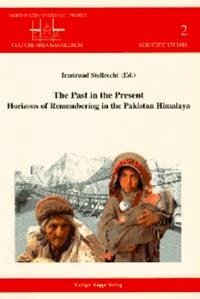In diesem Sammelband beschäftigen sich Ethnologen und Orientalisten mit der schriftlichen und oralen Verarbeitung von historischen Prozessen und Erfahrungen in Nordpakistan. Die Autorinnen und Autoren haben während ihrer Langzeitfeldforschungen in Nordpakistan selbst miterlebt, welche Bedeutung die Vergangenheit im gegenwärtigen Leben der Bewohner der Hochgebirgstäler einnimmt. Erfahrungen aus vorkolonialer, kolonialer und postkolonialer Zeit, Langzeitprozesse der Islamisierung sowie das aktuelle Aufeinandertreffen von traditionalen und modernen Lebensstilen sind thematische Schwerpunkte der Aufsätze. INHALT: Irmtraud Stellrecht: Writing Concerning the Past in Northern Pakistan – A Short Introduction. Wolfgang Holzwarth: Islam in Baltistan – Problems of Research on the Formative Period. Andreas Rieck: Who Are the Nurbakhshis? Controversy about the Identity of a Beleaguered Community in Baltistan. Martin Sökefeld: Jang Azadi – Perspectives on a Major Theme in Northern Areas’ History. Monika Schneid: Identity, Power and Recollection – Inside and Outside Perspectives on the History of Bagrot, Northern Pakistan. Johannes H. Löhr: Gender, Power, and Public Identity – Maintaining the Masculine Past. Maria Marhoffer-Wolff: Family History as Legitimizing Strategy – The Thui Khal¡fa. Ruth Göhlen: The Background of Genealogical Time Structuring and Remembering – Aspects of Time in Astor Valley, Northern Pakistan. Roland Hansen: Demonic Sabotage – Corruption – Natural Hazard. Channel Breaks and the Manipulation of “Myth” in Astor Valley, Northern Pakistan. REZENSION: „Insgesamt vermittelt die besprochene Sammlung von Beiträgen, die alle in eigener Weise das Thema Erinnerung und Geschichte im Alltag ansprechen, einen realistischen Eindruck von den vielfältigen Strukturen und Wechselwirkungen zwischen den alten Traditionen einiger Bergtäler Nordpakistans und dem modernen islamisch geprägten Einfluß von außen. Die Anordnung von weiteren, allgemeineren historischen Themen zu spezialisierten anthropologischen Themenbereichen in einzelnen Tälern oder Dörfern setzt diese gegenseitig in Bezug und hilft auch nicht mit der Region eng vertrauten Lesern einen sehr vielfältigen Eindruck von der jüngeren Geschichte und Kultur der Region zu gewinnen.” (Christian Luczanits in der „Zeitschrift der Deutschen Morgenländischen Gesellschaft“ 152/2002, S. 230-233). *** In this volume, cultural anthropologists and Oriental scientists deal with the written and oral treatment of historical processes and experiences in northern Pakistan. The authors themselves experienced, during their longterm fieldwork in this region, the meaningfulness of the past in the contemporary life of the inhabitants of the high-mountain valleys. Experiences from pre-colonial times, lengthy processes of Islamization as well as the current encounter between traditional and modern lifestyles are the thematic focus of the papers. CONTENTS: Irmtraud Stellrecht: Writing Concerning the Past in Northern Pakistan – A Short Introduction. Wolfgang Holzwarth: Islam in Baltistan – Problems of Research on the Formative Period. Andreas Rieck: Who Are the Nurbakhshis? Controversy about the Identity of a Beleaguered Community in Baltistan. Martin Sökefeld: Jang Azãd¡ – Perspectives on a Major Theme in Northern Areas' History. Monika Schneid: Identity, Power and Recollection – Inside and Outside Perspectives on the History of Bagrot, Northern Pakistan. Johannes H. Löhr: Gender, Power, and Public Identity – Maintaining the Masculine Past. Maria Marhoffer-Wolff: Family History as Legitimizing Strategy – The Thui Khal¡fa. Ruth Göhlen: The Background of Genealogical Time Structuring and Remembering – Aspects of Time in Astor Valley, Northern Pakistan. Roland Hansen: Demonic Sabotage – Corruption – Natural Hazard. Channel Breaks and the Manipulation of “Myth” in Astor Valley, Northern Pakistan
Bitte wählen Sie Ihr Anliegen aus.
Rechnungen
Retourenschein anfordern
Bestellstatus
Storno

